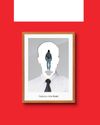
Somewhere I heard that a startup doesn't fail when it fails. It fails when the founders give up. In this "money is no longer free" market, that begs two questions: When should founders give up? And how should those founders manage their psychology while seeking the answers to such a momentous question?
I AM FACING THIS EXACT dilemma right now. My new consumer software startup has not gone particularly well by one sort of important measure: growth. It's been a four-year grind to find some signal of productmarket fit and we haven't found it yet. At one point, we had 12 people. Soon, it might just be my cofounder Jen Greenwood and me, at least until we rebuild in a more methodical way.
It's been like panning for gold in a turbulent river: Sometimes the prize feels closer, other times farther away.
Still other times it feels like we are drowning in aimlessness and exasperation. An identity crisis looms for any high achiever flirting with failure, and a calculation begins on the conflicting forces of sunk costs and lost time on the one hand, and reputational harm on the other. As entrepreneurs, we struggle to separate our egos from the prospects of our startups. We conflate the fate of the enterprise with our value as human beings.
Our startup has burned through $10 million of cash, much of it our own. Were it not for the privilege of access to capital that comes from my being an "exited" founder, we'd have been dead in the water years ago. As Marc Andreessen warned me during a Zoom meeting in 2020 (which did not lead to an investment): "Make sure you don't raise too much money or you'll be stuck working on this for a long time. Raise just enough to get to the milestones that justify the next raise."
Oops.
この記事は Fortune US の February - March 2024 版に掲載されています。
7 日間の Magzter GOLD 無料トライアルを開始して、何千もの厳選されたプレミアム ストーリー、9,000 以上の雑誌や新聞にアクセスしてください。
すでに購読者です ? サインイン
この記事は Fortune US の February - March 2024 版に掲載されています。
7 日間の Magzter GOLD 無料トライアルを開始して、何千もの厳選されたプレミアム ストーリー、9,000 以上の雑誌や新聞にアクセスしてください。
すでに購読者です? サインイン

The Blackstone Edge
90 DAYS. DOZENS OF INTERVIEWS. BILLIONS ON THE LINE. HOW BLACKSTONE'S CEO-MAKER GETS THE JOB DONE.

When Elon Musk has a really tough job, he turns to Steve Davis. DOGE might do the same.
IT WAS THE FALL OF 2022 when employees at Elon Musk's Boring Company began to notice Steve Davis wasn't around.

ASK ANDY - SHOULD MY STARTUP RAISE MONEY FROM VCS? IF SO, WHICH ONES DO I CHOOSE?
A FRIEND—I’ll call him Allen—spent years bootstrapping his real estate enterprise software company. After a long struggle to get to $1 million in sales, his business recently surged to $10 million, and revenue is now growing 100% year on year.

ELLIOTT HILL - JUST DOING IT
Staffers and brand loyalists cheered when Nike's new CEO came out of retirement to lead the company he has had an “irrational love” for since he began there as an intern. Turning it around will take more than good vibes.

HOW TO PLAN YOUR NEXT $100,000 VACATION
ON AN EXCURSION to the ancient city of Petra, Jordan, clients helicoptered in after-hours so they could tour the ruins alone.

THE BATTLE OVER AG1
Influencers are fighting over it. Scientists scoff at it. But the $100-a-month powder once known as Athletic Greens is only getting more popular.

THE WORKPLACE - GEN ZERS WANT TO BE THEIR OWN BOSS.CAN THE CORPORATE WORLD WOO THEM BACK?
CHASE GALLAGHER WAS 12 years old when he started mowing his neighbors' lawns in Chester County, Pa., for $35 a pop in the summer of 2013. At first the Gen Zer had only two customers, but thanks to some aggressive leafleting, he had 10 clients by the following year.

How much can DOGE do?
Elon Musk and Donald Trump aim to cut as much as $2 trillion in federal spending. It'll be even harder than it sounds.

YOUNG PEOPLE ARE DRINKING LESS ALCOHOL. CAN CEO MICHEL DOUKERIS PERSUADE THEM TO KEEP DRINKING AB INBEV'S BEERS?
SOME TIME AGO, top CEOs at an invitation-only seminar at Harvard Business School were asked to imagine the four crises they would likely confront during their tenure at the top: a health emergency, a geopolitical conflict, an economic downturn, and a trade war.

America's drug middlemen are now a $557 billion industry. Can Trump and his allies 'knock out' PBMs?
IN LATE DECEMBER, President-elect Donald Trump put pharmacy benefit managers, or PBMs, on notice.